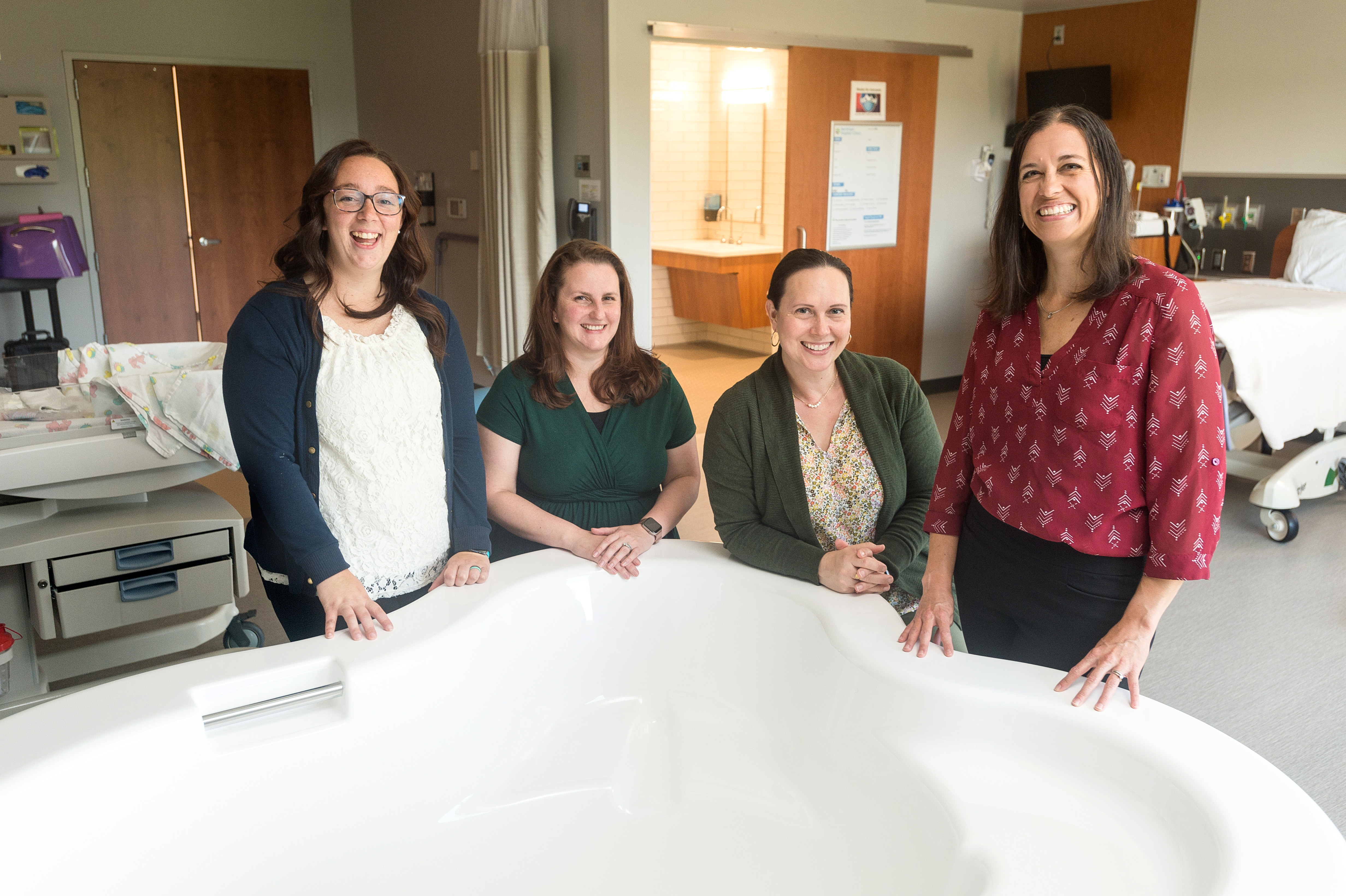
With four certified nurse midwives on staff, the Birth Center now has midwives on call around the clock – so whenever your labor begins, a midwife is available. (That’s pretty special for a hospital birth center.)
This gives you the option for birth with minimal intervention – with the resources of a hospital and OB/GYN doctors ready if you need them.
Midwives do water birth deliveries in the Water Birth Suite. “There’s something magical about water birth,” says Jessica Bohren, APRN, CNM. “We let mom and baby stay together in tub until they’re ready. It is a calming, magical moment.”
Patients appreciate how closely our midwives work as a team. “We think alike and practice alike – yet we each have something to add to the same question a patient has,” says Janelle Dahl, APRN, CNM.
“You won’t get different answers; you’ll get different perspectives from each of us for a richer, well-rounded understanding of your pregnancy and birth experience,” adds Brittany Cordes, APRN, CNM.
Midwife care can begin as soon as you know you’re pregnant.
Prenatal care
The first appointment at the Women’s Health Center is a 45-minute session with a midwife to review your medical history, have a physical exam and ultrasound, lab tests – and lots of conversation.
“We use this time for teaching, and to learn more about you: What are your questions, is there anything you’re scared about,” Jessica says. “And we give you lots of resources.”
You’ll see different midwives during your prenatal care. The team tailors information and resources to you – and gives flexibility when possible for your care.
“There are certain requirements that are there for your safety, such as glucose testing,” Brittany says. “In order to safely know that you and your baby are healthy, that’s a requirement. When and how we do it can be flexible.”
Some health conditions prevent midwife delivery: Chronic hypertension; insulin-controlled diabetes before pregnancy; and some cardiac problems. The midwives will talk with you about your options, including care from OB/GYN doctors and a maternal fetal specialist.
During labor and birth
When you’re in labor, midwives and labor nurses care for you in the Birth Center, letting the birth unfold through attentive waiting, natural alternatives, and low intervention. They empower you to choose what your body – and your baby – need.
Options include a wide range of natural birth aids – and pain medication, from nitrous gas to epidural and IV medication. “You absolutely can have medication with a midwife delivery,” says Janelle.
With any birth, there can be surprises. “Part of our job is to identify things that are not normal, and suggest alternatives,” Brittany says.
“When there’s a complication, it’s important that you know and trust us,” Jessica says. “For example, if it becomes clear that you need a c-section, and I’ve been with you for three hours and we’ve tried all the options and you were supported through all of it, then when I say, ‘We need to think about this differently,’ that’s an easier conversation because you trust me.”
Making a birth plan
NH+C’s midwives encourage patients to make a birth plan at around 20 weeks. It helps set expectations, and invites discussion during your prenatal care about your priorities. “We’re realistic reviewing your birth plan with you,” Jessica says. “We’ll say, ‘This is something we can do; this is something we always do; this is part of our routine care, and this is not.’”
“A birth plan is a guide; it’s not a requirement for how your experience will unfold,” Brittany says. “We can’t always do certain things, but we’ll try our hardest to make something work.”
At “fourth-trimester” post-partum clinic visits, the midwives check on your mental health and overall well-being. They’ll ask how you’re feeling about your birth experience. “We want to know how you’re doing processing your birth story,” Janelle says. “Because your story is important to you.”
And what’s important to you, is important to your midwives.
Learn more about Midwives
Learn more about Pregnancy Care
